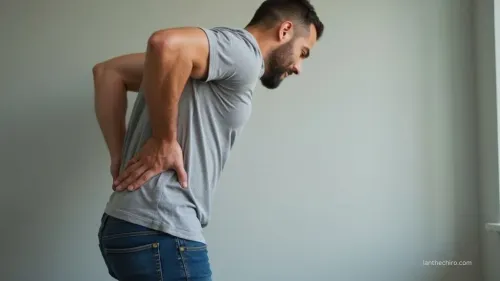Cheras Office Syndrome: Why This KL Suburb Has Unique Posture Problems
In Cheras, you’re often stuck at your desk, squeezed into non-ergonomic chairs, and enduring long commutes, habits that strain your posture and leave you achy. Add in hours spent on devices after work, and your muscles never get a real break. Small changes, like adjusting your workstation or including stretch breaks, can make a big difference.
If you want to feel better and move with less pain, there are practical strategies waiting for you just ahead.
The Rise of Desk Jobs in Cheras: A Perfect Storm for Poor Posture

As desk jobs have surged in Cheras over the past decade, more than 70% of residents now find themselves spending hours seated at work. If you’re among them, you’ve likely noticed how easily poor posture creeps in, slouching at your desk, craning toward screens, or rounding your shoulders during long stretches of computer use. These habits don’t just cause discomfort; they set the stage for chronic neck and back pain that’s all too common in Cheras’ office culture.
Recognising these patterns is the first step. To counteract the effects of desk jobs, focus on body awareness: check your alignment, gently reset your sitting position, and take regular breaks to move. Simple changes in your daily routine can make a profound difference for your spine.
How Local Workspaces Contribute to Spinal Strain
You might recognise your own workspace in Cheras, tight desks, rigid chairs, and little room to stretch or move. These setups often lack ergonomic furniture, forcing you into slouched or forward-leaning postures that strain your spine.
High-density offices leave little space for movement, so you’re stuck in static positions, which promotes muscle tension and misalignment over time. Without adjustable desks or supportive accessories, your body adapts to poor posture, making neck and back pain almost inevitable.
Even frequent use of mobile devices encourages forward head posture, further aggravating discomfort. Start by becoming aware of your habits and workspace.
Small changes, like adjusting your chair height, seeking ergonomic furniture, or taking regular stretch breaks, can markedly reduce spinal strain and help restore healthy posture.
Commute Challenges and Their Impact on Back Health

While maneuvering Cheras’ daily commute, many find their back pain intensifying before even reaching the office. Hours spent commuting in traffic force you into static, unsupported positions, straining your spine and shoulders. Without proper lumbar support in your seat, your posture suffers, neck and back misalignment become all too familiar.
Frequent stop-and-go traffic leads to subtle, repetitive tension in your muscles, which builds up silently. Over time, these habits can weaken your back muscles, amplifying the risk of chronic postural issues that linger long after the drive ends.
To protect your back, stay mindful of your posture during commutes. Adjust your seat for better lumbar support, keep both feet flat on the floor, and take brief movement breaks whenever possible. Small changes can make a big difference.
Tech Habits After Hours: The Hidden Culprit
Even after shutting down your work computer, tech habits can quietly continue to sabotage your posture and well-being. Scrolling through your phone or multitasking on multiple screens in the evening often leads to a forward head posture, increasing neck pain and upper body tension.
You might find yourself slouched on the sofa or using your device in bed, unaware that these positions worsen muscle imbalances and contribute to “Office Syndrome” symptoms. Prolonged screen time after hours also strains your eyes and can trigger tension headaches.
It’s easy to underestimate how these subtle routines reinforce poor posture and chronic discomfort. By tuning into how you use devices at home, you can start to recognise patterns that affect your neck and shoulders, empowering you to make healthier choices.
Practical Solutions for Pain-Free Workdays in Cheras

Although Cheras' office culture presents real posture challenges, simple, mindful adjustments can transform your daily comfort. Start by evaluating your workstation, raise your screen to eye level and support your lower back with an ergonomic chair or cushion. Prioritise posture by keeping your feet flat and your shoulders relaxed.
Since many Cheras offices lack ergonomic furniture, consider portable lumbar supports or seat pads. Set a timer to remind yourself to stand, stretch, or walk briefly every hour. Incorporate targeted stretches for your neck, shoulders, and lower back to counteract stiffness from prolonged sitting.
Strengthening exercises, like core activation or shoulder blade squeezes, can help reduce pain and build resilience. These small, consistent changes empower you to prevent office syndrome and enjoy pain-free workdays in Cheras.
Frequently Asked Questions About Office Syndrome in Cheras
Are Certain Age Groups in Cheras More Affected by Office Syndrome?
Yes. Young adults and middle-aged office workers in Cheras are more likely to experience office syndrome due to long hours of desk work and screen time. This group often deals with muscle tightness, poor posture, and repetitive strain from daily routines.
How Do Dietary Habits Influence Posture-Related Issues in Cheras?
Poor nutrition can weaken muscles and bones, which affects posture. Staying hydrated, eating balanced meals, and limiting processed foods can help support your musculoskeletal system and make it easier to maintain good posture.
Can Traditional Malaysian Remedies Help With Office Syndrome Symptoms?
Traditional remedies like herbal compresses, turmeric-based drinks, and massage can provide short-term relief from tension and discomfort. For longer-term results, combine these with regular stretching and better posture habits.
What Role Does Mental Health Play in Posture Problems?
Chronic stress and anxiety can lead to muscle tension and poor posture, especially around the neck and shoulders. Managing mental health with techniques like breathing exercises and gentle movement can help reduce this strain.
Are There Community Programs Addressing Posture Awareness in Cheras?
Yes. Cheras has local workshops and fitness classes that promote posture awareness. These programs often focus on practical strategies to improve daily habits and reduce posture-related discomfort.
Managing Office Syndrome in Cheras Starts With Small Fixes
You’re not alone, studies show up to 80% of office workers experience back pain at some point, and Cheras’ lifestyle makes you especially vulnerable. But you can take charge of your well-being. By tuning in to your body, adjusting your workspace, and moving regularly, even small stretches during traffic, you’ll ease discomfort and strengthen your posture.
Remember, every mindful change gets you closer to a pain-free routine. Your body deserves that care, right here in Cheras.














